- Home
- Jack Gantos
What Would Joey Do? Page 4
What Would Joey Do? Read online
Page 4
“Take it off for a minute,” she said.
“Sure,” I replied. Even though she couldn’t see it I thought I should be polite.
As soon as it was in her hand she stood up and calmly made her way over to the microwave. “Watch this,” she said mischievously. She tossed it into the microwave and turned it on high, working the buttons quickly. The microwave began to rattle like a machine gun. Wisps of smoke leaked out the vent, and I thought it was going to explode. When her mom came running in, Olivia pointed to where I was jumping around and blurted out, “He did it! He did it!” I told Mrs. Lapp I didn’t, but all she said was, “Now, Joey, we all know better than to put things in the microwave—especially something with metal on it.” Then she had to use a spatula to scrape my melted Tweety Bird off the bottom of the microwave. It looked like a fried egg with the pitted metal clasp on one edge.
I spelled MEAN BLIND GIRL on the label gun and sneaked up next to Olivia and stuck it to her cane.
“Excuse me for a minute,” she said, staring directly into the bright ceiling lights without blinking, “I have to go to the ladies’ room.”
A minute after she returned, her mother marched into the kitchen. “Joey,” she said forcefully, “follow me, please.” She directed me into the bathroom. My name was scrawled in big loopy Magic Marker handwriting all over the bathroom walls. “Explain this please.”
“I didn’t do this,” I said. “Cross my heart and hope to die.”
“Never hope to die,” Mrs. Lapp cautioned. “Hope is one of God’s greatest gifts to the world.” Then she returned me to the kitchen and made me write a list of all the things I hoped for, and she taped it to the little chalkboard she had on her teaching easel, and later we went over the whole list one by one.
“You hope Pablo learns to speak?” she asked. “And for jelly and jam to be the same thing? And for people to be able to hold their breath long enough for the bus to arrive? Joey, don’t you think you should hope that people never lie or cheat or steal?”
“I didn’t think of that,” I said, and shrugged.
“Well,” she replied, “that’s why you are here, because instead of thinking about things that don’t count, I’ll teach you to think about things that do count.”
My first day was a long day. They were like a mother-daughter tag team. As soon as Olivia worked me over with her bratty tricks, her mother started in with her rules for making me a better person. During quiet time we sat in the kitchen with the lights turned low and listened to a Bible recording chanted by monks. I just wanted to go home, and once I did get home, I began to worry about the next day.
The job of being Mrs. Lapp’s secret helper started every morning as I stood on their front doormat and stared at a little green plaque screwed at eye level onto her front door. Painted in cursive yellow letters were the initials W.W.J.D.?, which I learned stands for “What would Jesus do?” Olivia’s mom is very nice and very religious, and every time she opens the door, she greets me by singing, “What would Jesus do?” like that is a piece of a song the doorbell plays. The first time she did it, I thought it was a homeschool pop-quiz, and I wasn’t exactly sure what Jesus would do, because we didn’t go to church too often, and what I knew about Jesus was from a little prayer book Grandma gave me that said Jesus loved children so much he died in order to help save them from the sins they were born with—which was a scary thought because Grandma said to me about a million times, “Joey, you are your own worst enemy.” So maybe I was born with something extra bad inside me.
I guess my mind had wandered after I rang the doorbell that first day because Mrs. Lapp suddenly touched me on the tip of my nose and when I looked up at her she repeated, “What would Jesus do?”
“How would I know?” I said, puzzled. Then I blurted out, “Wipe his feet?” And I wiped mine back and forth like I was rolling a log in water because Mom had always told me to start a new project by putting my best foot forward and I figured my best foot would have to be clean.
“Well, maybe he would do that,” she had said. Then after a pause she added brightly, “Why, I bet he did always wipe his feet. I bet he used his manners. Why, I think you are very polite,” she sang, and patted me on the head. “Olivia can really learn some friendship skills from you.”
Since that first morning I’ve told Mrs. Lapp that Jesus would clean his room, say please and thank you, always respect his parents, never talk back, eat his vegetables, floss his teeth, help wash the dishes, and use soap when taking a bath. I was running out of things to say, to tell you the truth.
So there I was again, the morning after the motorcycle crash, breathing deeply in front of the Lapps’ front door and wiping my feet and trying to think of something helpful to say, but I couldn’t, so I knocked and hoped for the best. I figured something would blurt out of my mouth.
Mrs. Lapp opened the door and smiled. “Good morning, Joey,” she sang. “Now, what would Jesus do?”
“Well, Mrs. Lapp, I’m not really sure today,” I said, just thinking out loud. “I believe I’d like to have Jesus come to my door and look at my W.W.J.D.? sign, and when I opened the door, I’d ask him, ‘What would Joey do?’ because right now I need some answers to some big questions.” As soon as I said it, I figured Mrs. Lapp might take offense at the idea that Jesus might knock on my door so I could ask him a question. After all, he was supposed to be the most perfect person who ever lived, and I was like an encyclopedia of imperfections, so there was no reason he would come to me. So I smiled my big smile that stretched my face from ear to ear and held it that way until I could feel my dry lips cracking.
“Oh,” she said, stepping back, “that’s an interesting thought. What would you ask him?”
“Well,” I said, and took a deep breath, “my dad showed up on a motorcycle and my mom who claims not to like him stuck a broom in the spokes yesterday as he buzzed our front yard and he ended up flying through the air and stabbing himself on a tree branch, so then I thought she liked him again but it turns out she didn’t because later she tried to hit him in the face with a water glass in front of her new boyfriend. So I think I’d ask Jesus if I should try to help my parents get along, or if I should just ignore them and get on with my life like my grandmother says I should.”
“Now, honey,” Mrs. Lapp said calmly, and touched her fingertips to her heart, “Jesus taught us to always tell the truth.”
“I am telling the truth,” I insisted. “My family is scaring me a little bit. I used to think they were normal, but now I’m thinking they are something other than normal.”
Mrs. Lapp took a deep breath. “God works in mysterious ways,” she said. “Don’t give up on your family. They are the way they are for a reason, even if you don’t know it yet.”
“Well, I’d really like to know the reason,” I said, “because I’m trying my best, but some days are pretty confusing.”
“Yes,” she said, and took a deep breath. “Some days are confusing.” And I knew she meant Olivia was giving her a hard time and that God was being mysterious again.
I dragged my backpack with Pablo sleeping inside through the doorway. The little alarm chime went off like at a store just to announce someone was coming or going. I figured Mrs. Lapp was always afraid Olivia might wander off on her own.
In the kitchen, where we spent most of our school day, I held my hands up over my eyes to keep from squinting. The ceiling was covered with overhead lights. They didn’t help her see, but Mrs. Lapp told me Olivia suffered from “light deprivation syndrome” and the extra light she absorbed through her skin was good for her mood. It wasn’t working today.
Olivia was sitting at the table with a halo-shaped cookie cutter hovering over a sheet of cookie dough as she stared down at it. The cookie sheet was a jumble of overlapping ovals.
“What are you doing?” I asked.
“Homework,” she replied. She didn’t bother to look up at me because it didn’t matter. To her I was just a smudge with a voice. “One of the bad
things about being homeschooled is that you are always doing homework. And as you know, Mom is always trying to turn every little moment into a lesson. She’s making angel halo sugar cookies for the church fair, but at the same time she has turned this into a math lesson. Now I have to figure out how many cookies I can get per sheet.” She stamped at the sheet and then pressed a button on her calculator, which was the size of a Monopoly box and had a voice that spoke out the numbers as she pressed them.
“Can I help you?” I asked.
“Why?” she replied, sounding a bit testy, like she always does because she is so touchy. “Why? Do you think I can’t do this just because I can’t see your twitchy-jumpy-hyper ferret face?”
I wished Mrs. Lapp had never told her about my ADHD.
“It’s just that at the rate you are going, you’ll have a hundred cookie pieces per sheet.”
“What do you know about math?” she asked, and stared hard at me with her glassy eyes wide open like twin telescopes pointing into outer space.
“I know a lot,” I said. “Try me.”
“Okay,” she said. “Here’s a test. If Pablo barks at a rate of two and a half barks every three seconds, how many barks will he bark in an hour?”
“Do I have an hour to answer this?” I asked.
“Take your time, Einstein,” she taunted.
I knelt down and pulled Pablo out of my backpack. “Okay,” I whispered in his ear. “You better have eaten your Wheaties.” I pointed at the kitchen clock. “Ready,” I said to him, “go.” Then I began to chase Pablo, and he started barking and running in tight little circles and he sounded like a doggy tap dancer with his nails tapping away on the tile floor and I tried to keep count of how many barks he barked for a minute and then I would multiply that by sixty, but I kept losing my place because I kept lunging at him to keep him going and pulling on his tail and blowing into his face and before long I really didn’t care how many barks he barked but it was a lot.
Just then Olivia’s mother marched into the kitchen. “Joey,” she said in a voice most people use when ordering a dog around, “W.W.J.D.?”
“Use a tape recorder,” I said right back, because I figured it would be easier to count the barks if I didn’t have to chase him at the same time.
“Joey,” she said, and made a frown out of her whole face, “I told you not to bring Pablo to school. You know he is very disruptive.”
“Yes, Mrs. Lapp,” I said. “I’ll take him home.” I knew Mrs. Lapp didn’t allow Pablo in her house, which is why I began to sneak him in so then I could get caught and have to take him home where I could sit around and watch TV soaps with Grandma and make soap opera star labels like BACK STABBER and SCARY FACELIFT and CON MAN and GOLD DIGGER and INSANE TWIN SISTER and LONG-LOST HUSBAND and stick them on the screen. I always wore GREEDY WHINER on my forehead, and Grandma wore EVIL NANNY on her sweatshirt because if she stuck it to her body it would peel her skin off when she removed it.
Only after Mrs. Lapp called looking for me would I have to go back. It was a good trick and would give me a break from Olivia.
But Olivia had caught on. “I’m going too,” she insisted.
“If I go by myself,” I said to Mrs. Lapp, “it will just take me a minute.”
“It’s time for morning recess anyway,” Olivia pointed out. “I want to go.”
Mrs. Lapp seemed relieved and glanced up at the clock. “Sure, why don’t you two guys take Pablo home? But come right back.”
Olivia hopped up and made a beeline for her bedroom. On the way she hit the kitchen doorjamb with her hip, and I saw her wince as she crossed the living room. I knew it had to hurt because a few weeks ago we were in a hot tub in the backyard and she had a bathing suit on and both her hips down to her knees were all bruised up, red and purple. I thought maybe her mom spanked her on one side while her dad spanked her on the other, and when I asked, she laughed. “No. My parents don’t spank me. I’m the one with the disability, so I get to spank them.”
“Oh,” I said.
“They aren’t like your parents,” she said. “Both of yours are nuts, and your grandmother sounds creepy.”
Ever since I told her about me and my family, she wouldn’t stop teasing me. That didn’t bother me too much because she was so mean about her own family who I thought were really nice to her. Her mother waited on her like a slave, and her dad was something off an old TV show where the people are so nice they aren’t real. He was a big-rig truck driver who was only home on weekends, and when he arrived on Fridays, she made him carry her everywhere as if she were his personal cargo. He was one of those skinny guys with a pot belly like pizza dough, and she locked her arms around his neck and hooked her long stringbean legs behind his knees, and from a distance they looked like Siamese twins staggering around the house.
When she returned from her room she was wearing a bicycle helmet, an orange reflector sash, knee pads, and elbow pads.
“Don’t dawdle,” her mom said as we went outside. “I want to work on fractions when you come back.”
“I’ll do my best,” I said, and gave her a crooked smile, because there was just no way to hustle Olivia along.
When we went outside, she walked so slowly down the sidewalk, it was as if her Buster Brown shoes were the noses of two bloodhounds sniffing out an escapee. She walked with one hand sticking straight out like a sleepwalker, and the other held her cane so she could smack me on the leg and make sure I hadn’t run off because it was really hard for me to move so slowly.
“Why do you put up with me?” she asked, and hit me on the leg.
“I need a friend,” I said.
She laughed. “And you expect me to be your friend?”
“Yes,” I said.
“Well, if you are going to be my friend, you have to know what I hate,” she said. “Knowing what I hate is more important than knowing what I love.”
“I don’t want to know what you hate,” I said. “Really.”
“Then you’ll never be my friend,” she said. “Because most of who I am is defined by what I don’t like.”
“I always thought it was harder to choose what you did like than what you didn’t,” I said.
“No, you have it backward, as usual,” she said harshly.
“You sound a lot like my grandma,” I said. “I think you two have a lot in common. You should meet.”
“So do you want to know what I hate?” she asked, and raised her cane up over my head. “Or are you just going to jabber on?”
I flinched. “Tell me,” I said.
“I hate that everyone tries to help me. I mean help me with everything. You’d think I was retarded—not blind. I’d rather get hit and flattened by my dad’s semi than have one more stranger grab me by the collar and jerk me out of my shoes and back onto the sidewalk every time I step off a curb.”
“Okay,” I said, “but it is nice that somebody wants to help you.”
“No, it’s not,” she said. “It’s like being a little kid forever. It’s like they want to seal me up in one of those clear plastic balls like a scorpion or put me into one of those wintry snow domes and give me a shake every Christmas.”
“I like Christmas,” I said.
She threw back her head and groaned. “You sound just like my mom. She likes everything cute. It’s disgusting. Anytime I say I don’t like something, she tells me to cheer up and think of life on the bright side. That’s usually when I remind her that I’m blind and couldn’t see the bright side even if I wanted to.”
Listening to her was making every muscle in my body tense up, as if a boa constrictor were trying to crush my ribs. “I’ll be right back,” I gasped. I took off running down the street as fast as I could and my mind was racing a mile a minute and I was thinking that Grandma wanted me to make a friend and here I was in a classroom where there was only one other student and she was about the most unfriendly person I had ever met and I had no idea how to win her over because being a secret helper superhero was get
ting me nowhere. And all I could wish for was to return to my old school and get back into my classroom and meet some nice kids and try to have a life that was all about what people liked instead of what they hated.
When I returned she was standing on her tiptoes with her face high up in the air feeling the breeze blow across her skin. I wanted to ask her if the wind felt like butterfly wings, but then I knew she would snap at me so I kept my mouth shut and just stared at her. But she must have heard me return.
“I can feel you staring at me,” she growled. “That’s another thing I hate. People who stare.”
“Sorry,” I said and stared at Pablo instead.
When we got to my house, I asked if she wanted to come in.
“Why?” she snapped. “I thought you were just going to ditch your dog then skip school.”
“We can’t do that,” I said. “Now just come in and meet my grandmother.”
“Why?”
“Because it would be a special favor to me if you told her we were good friends.”
“But I’m not your friend,” she snarled. “A real friend would skip school with me.”
“Please tell her we’re friends. She’s sick and it would really cheer her up.”
“We’re all sick,” she said.
“Some of us are sicker than others,” I replied, and had to bite my tongue to keep from calling her the sickest one of all.
“I make it a rule to never cheer anyone up,” she declared.
“Then you should really get to know my grandma. Like I said, you have more in common with her than you do with me.”
She shrugged, then turned around and tapped back down the sidewalk a little ways. “Aren’t you coming?” she asked, without turning toward me.
“I have to go feed Pablo,” I said. “You be the tortoise and I’ll be the hare and we’ll see who gets back to your house first.”

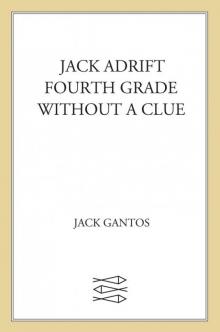 Jack Adrift
Jack Adrift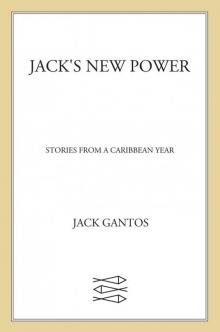 Jack's New Power
Jack's New Power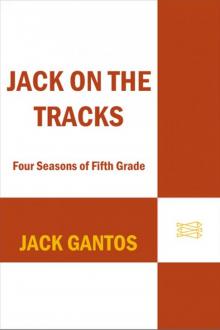 Jack on the Tracks
Jack on the Tracks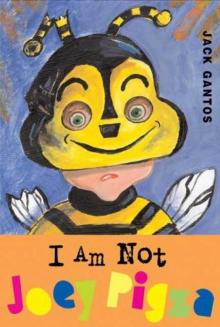 I Am Not Joey Pigza
I Am Not Joey Pigza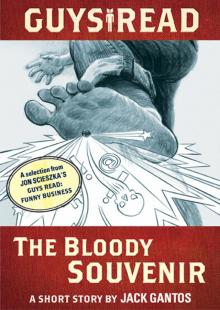 The Bloody Souvenir
The Bloody Souvenir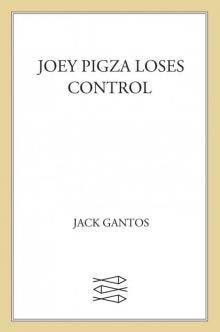 Joey Pigza Loses Control
Joey Pigza Loses Control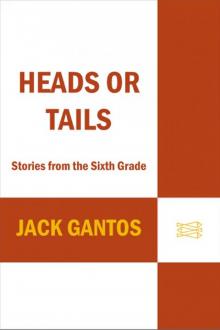 Heads or Tails
Heads or Tails Hole in My Life
Hole in My Life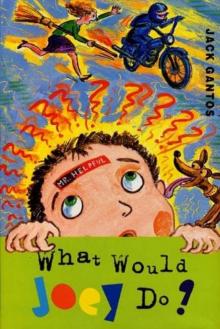 What Would Joey Do?
What Would Joey Do?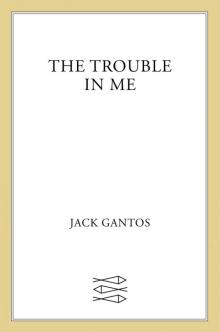 The Trouble in Me
The Trouble in Me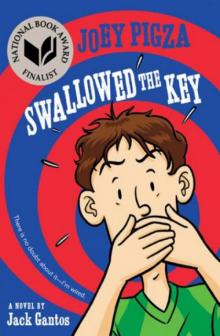 Joey Pigza Swallowed the Key
Joey Pigza Swallowed the Key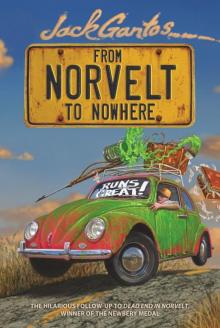 From Norvelt to Nowhere (Norvelt Series)
From Norvelt to Nowhere (Norvelt Series)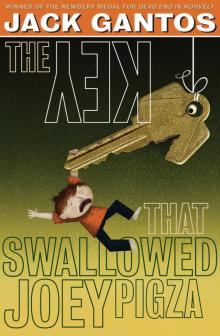 The Key That Swallowed Joey Pigza
The Key That Swallowed Joey Pigza Jack's Black Book
Jack's Black Book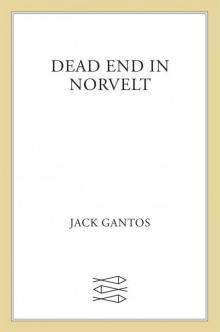 Dead End in Norvelt
Dead End in Norvelt